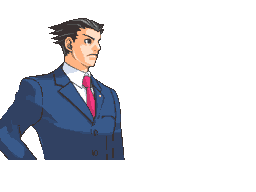theannacracker
(?)Community Member
Offline
- Posted: Mon, 21 Mar 2011 21:48:10 +0000
So you want to be an Artist in the Game Industry...
A very, very beginners guide to becoming a game artist

A very, very beginners guide to becoming a game artist

Disclaimer: First off, I hope you all like my obnoxious pictures.: emo This thread is meant to be a very simple guide for people who might be interested in working for games and what to expect. I am by no means an expert, I have only been in the industry for less than a year, but have spent 4 years learning about becoming a games artist. I can only give an overview because of my lack of experience, but I hope it is helpful to some at least. If you feel I have missed something extremely important, please speak up! Also comment if my account is different than your personal experience in the industry.
Game Designer =/=Game Artist
See also: you are not a game designer!!!!11!!

I've received several PMs from young people who have claimed they want to get into "game design". Upon asking them what they mean about game design, it usually becomes clear that they mean they want to make art or animations for games. While artists can be game designers, game designers are NOT usually artists. Game design is about making a game fun, and figuring out the mechanics of the game, levels, and how those elements will lend to the game experience. Game designers can be writers, producers, programmers, and artists. You do not need art skill other than basic sketching to be a designer. Larger companies will usually have designated game designers, and smaller companies might get all game developers involved with the game design.
This term is incredibly abused by those looking into the game industry. So please, STOP CALLING YOURSELF A GAME DESIGNER if you really want to work as a game artist/animator.
What types of positions are there for artists in the industry?
Where's the money at, bitches?
Good question! There are many different positions an artist can hold in the game industry. Some are more competitive than others. Here are some of the most common jobs you can hold:
-2D Artist/ Concept Artist
-2D Animator
-3D Animator
-Texture Artist
-3D Character Artist
-3D Environment Artist
-Technical Artist ( FX, Rigging)
-UI Artist
-Art Director/ Art Producer
-2D Animator
-3D Animator
-Texture Artist
-3D Character Artist
-3D Environment Artist
-Technical Artist ( FX, Rigging)
-UI Artist
-Art Director/ Art Producer
What programs are commonly used in the industry?


Programs differ from studio to studio, and most will tell you they look for skill and knowledge of fundamental concepts rather than what program you use. Nevertheless, learning certain programs will give you a step up. Please keep in mind that many of these programs run pretty high, look for student versions of the software to lower the price, or use free software such as GIMP, Blender, Scuptris etc until you can find more professional software.
-Adobe Photoshop
-Adobe Flash
-Adobe Illustrator
-Autodesk Maya (Student Version IS FREE)
-Autodesk 3DS Max(Student Version IS FREE)
-Autodesk Mudbox(Student Version IS FREE)
-ZBrush
-DeepPaint 3D
-UV Layout
-Marmoset Toolbag
-Adobe Softimage XSI
-Game engines such as Unity 3D, UnReal, Source, etc
Etc (comment to add to this list!)
How do I "break in" to the industry?

One word: Connections
Don't get me wrong, it'll be harder to get into the industry if you don't have the skill to do your job, but connections go a long way in the industry. Like any business, networking is extremely important to getting name out. Schools, clubs, websites, contests, conventions, friends, and family are places where you might find people who will help you into the industry... or at least pass my portfolio around. All of my job opportunities have been through connections at school and people I met at conventions. I have never been offered a position from applying alone.
Networking:
School: Usually schools with connections to the game industry will have days where companies can come and review your portfolio, or at least they will have counselors who will helpfully tell you what companies are hiring. If you are lucky enough to be able to go to a college with these resources, use them to your advantage!
Conventions:
Game conventions and conferences happen all over the US. Pax and GDC are two examples of extremely popular game industry events. Companies get to show off their new games, offer portfolio reviews, have parties, and give you time to fanboy all over them. Events like this are great for getting your name out in this small industry, especially if you can get into company parties and private events where you can get to know game developers better. Bring business cards, a portfolio, resumes, and other networking goodies (stickers, buttons, fun swag?) to these events.
Game/Drawing Clubs:
DO some research on your local game clubs, lifedrawing sessions, and drawing jams. Hanging out at one every week will most likely get you to talk to other artists and game devs. A great example of a more local game dev community would be the IGDA. There's a link to their website in the "resources" section. See if they have a chapter in your area!
Friends/Family:
Do you have a friend who works in the game industry? It's time to get back in touch with them and start inviting them to group events. If you are an art student, start building solid relationships with your peers right NOW. Go to social events, or make social events. The more your name is out there, and the more friends you have in the game industry, the better chance is that you will have job offers from them in the future! Also, if your sibling works in the game industry, you might want to visit them and ask them about their job, or if their company is looking for interns. You never know!!
Schools?


Look for schools with connections to game companies. School gets you set up with a portfolio and contacts. However, you do not need a degree of any kind to get a job in the industry, but connections help.
See the Art School Prep Thread for more details.
What is it like to work in the game industry?
"It's not all fun and games."

-You work long hours depending on deadlines. I've seen people sleep in their offices during "crunch time".
- Pay is low to moderate. Starting salary for artists is around 35k-40k, the average is around 50k.
-Certain jobs are easier to find if you have the skills to do them. Technical Artists, UI Artists and Environment Artists are in higher demand than concept and character artists.
-You must be able to work quickly,in the studio/game's style.
-You must understand the entire production pipeline in order to work with others to get the game working. A very basic knowledge (at least) of the 3D art pipeline is needed.
YOU WILL NOT BE PLAYING GAMES ALL DAY.


If you are a gamer, and want to get into art because you have a passion for playing games, please do not look to become an artist in the game industry. Art should come FIRST and games should come second. It's important to be in the know about the game industry, and play games to research and games you personally enjoy. HOWEVER if you play Call of Duty all day and expect to be able to keep up the gamers lifestyle, you will be in deep s**t when it comes time to pay back students loans.
That being said, there are some awesome things about being in the game industry;
(fun stuff depend on studio, this is just from my experience)
-Since there is so much work to do, studios want to keep their artists fed and caffeinated. Free food and energy drinks galore!
- You don't have to grow up (that much) in the game industry. Being silly, swearing, and wearing comfortable clothes are expected.
- You get to draw/paint/model/animate all day!!! And get paid for it!
- you can tell friends and family that you make games for a living.
Resources:
Game Dev Related:
Gamasutra
GameDevMap
IGDA
GDC
Game Art Related:
PolyCount
CGHub
CGSociety
ConceptArt
Game Artisans
Autodesk's Student Resource Center (Free s**t)
Please discuss:
The game industry
Working in the game industry
Game art
Agree, disagree, comment!!
The game industry
Working in the game industry
Game art
Agree, disagree, comment!!
